www.northjersey.com
Ex-Beatle Paul McCartney gets his due in critical reassessment
Jim Beckerman, Staff Writer
Published Sept. 6, 2017
The ex-Beatle, recognized for his innovative musical and conceptual contributions to the group, brings his 'One on One' tour to the Prudential Center.
Paul McCartney will always be the "cute" Beatle.
But lately, thanks to a sea-change in critical fashion, he's also become the cool Beatle.
"With the passing of time, there's been this re-assessment," says Dennis Diken of Wood-Ridge, a rock historian and the drummer for the Smithereens.
With McCartney fever bursting the thermometer as his "One on One" tour rolls into Newark's Prudential Center (Sept. 11 and 12), Madison Square Garden (Sept. 15 and 17), Barclays Center (Sept. 19 and 21) and Nassau Coliseum (Sept. 26, 27), it's hard to even recall the snide treatment he's gotten over the years from some critics and fans.
"There was a perception that Paul is a non-rocker, a weak guy who just writes pretty songs," says David Wills of Woodcliff Lake, who, as "Ghosty," hosts the "Vintage Rock & Pop Shop" show from noon to 3 p.m. Sundays on WFDU 89.1-FM.
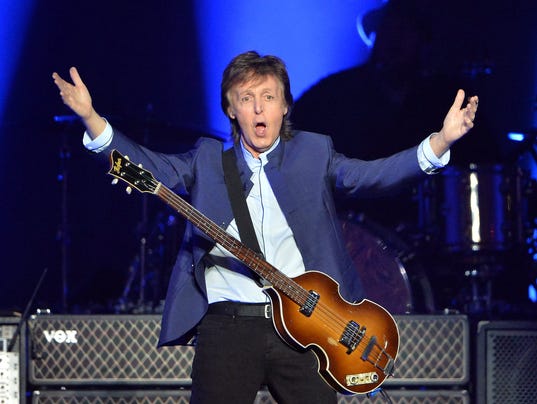
Paul McCartney greets the crowd at the start of his "One on One" tour on Wednesday, April 13, 2016, at the Save Mart Center in Fresno, Calif.
(Photo: SILVIA FLORES, TNS)
Mostly, that's all in the rear-view mirror now. "It's a perception that belongs to a certain time period, and a specific age group," Wills says. These days, Sir Paul is treated with godlike reverence by journalists, biographers and, not least, other rock gods.
"I was driving up Eighth Avenue, and on the side of the Garden was this huge poster," Max Weinberg, drummer for Bruce Springsteen's E Street Band. "It had the date, 9/15/17, and 'Madison Square Productions,' and in the middle was this humongous Höfner bass — Paul McCartney's bass. I stopped in traffic and took a picture of it. I said, that's the coolest thing I've ever seen. There's nobody else in the world who could have just the date and that bass. So I [texted] it to Bruce, and he sent me a very appropriate response, that indicated that all of us in our generation are still huge fans
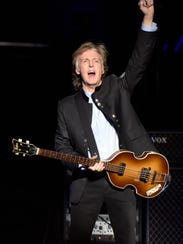
Paul McCartney performs on the One on One Tour at the Hollywood Casino Amphitheatre on Wednesday, July 26, 2017, in Tinley Park, Ill. (Photo: Rob Grabowski, Rob Grabowski/Invision/AP)
Even ornery Bob Dylan is a gushing schoolgirl when it comes to McCartney.
"I'm in awe of McCartney," Dylan told Rolling Stone in 2007. "He's about the only one that I'm in awe of. He can do it all. And he's never let up. He's got the gift for melody, he's got the gift for rhythm, he can play any instrument. … He's just so damn effortless. I just wish he'd quit."
Such sentiments were not so common a generation ago, when it was fashionable to look at McCartney with a jaundiced eye.
Certainly he was a Beatle, beloved by millions, and half of the greatest songwriting team in rock history. Yet from the beginning, there was an undertone of condescension in some of the write-ups he got.
"My own feeling is that [John] Lennon has heavy talent and that McCartney really hasn't," the rock critic Nik Cohn wrote in 1969, just as the Beatles were wrapping up their short, brilliant run.
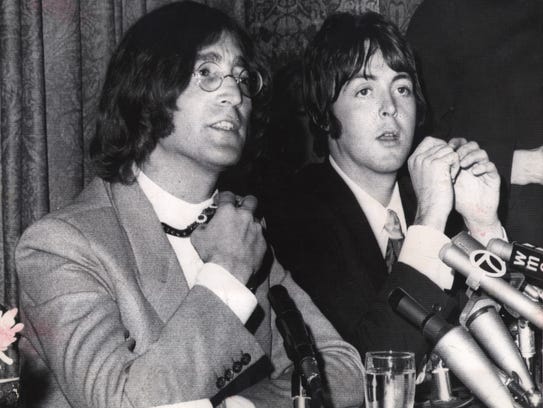
John Lennon, left, and Paul McCartney flew to New York in May 1968 to announce the creation of Apple Corps Ltd., a record label and multimedia company. (Photo: File photo)
McCartney, Cohn wrote, was "melodic, pleasant, inventive, but he's too much syrup." Lennon, by contrast, "wrote songs as if he was suffocating" — apparently a good thing. Still, Cohn noted, "they do make a partnership."
That attitude, common for years, probably dates to the very beginnings of Beatlemania. As every screaming teen knew in 1964, John was the "smart" one, Paul was the "cute" one, George was the "serious" one, and Ringo was the "loveable" one.
Intellectuals gravitated to John, who wrote books of punny Lewis Carroll nonsense and had a strong contrarian streak. McCartney, by contrast, was a pleasant, personable fellow who seemed to care about social acceptance, and was eager to delve into high culture. He was a Beatle your mother could love.
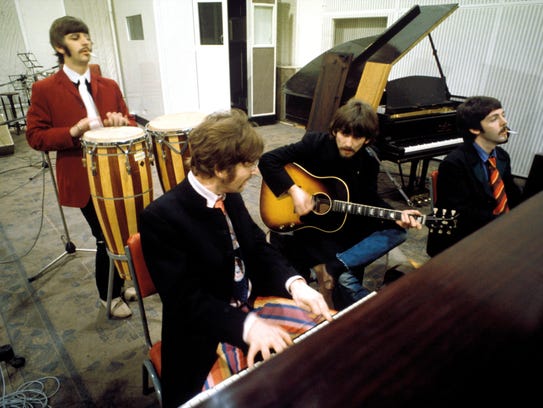
The Beatles recording "Sgt. Pepper's Lonely Heart's Club Band" in 1967. (Photo: Apple Corps Ltd.)
To teenyboppers, all this was catnip. But to a more "serious" kind of rock fan, for whom rock meant rebellion and "authenticity," McCartney was suspect. It didn't help that he had a freakish melodic gift, and could toss off a classic song like "Yesterday" while casually remarking that his working title had been "Scrambled Eggs." He seemed like he might be a Tin Pan Alley songwriter in rocker's clothing.
"Paul could write about anything," says Mark Lapidos of Montvale, founder and president of the Fest for Beatles Fans, now in its 44th year (the next one will be March 9 to 11 in Jersey City). "He was commercial, but he was also very avant-garde."
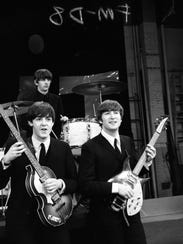
From left, Paul McCartney, Ringo Starr and John Lennon of the Beatles rehearse before an appearance on "The Ed Sullivan Show." (Photo: Fred Morgan/New York Daily News)
In those days, there was a less granular understanding of what went on inside BeatleWorld. Songs were credited to "Lennon/McCartney," one of the great brands of pop history. No one could be entirely sure who wrote — or played — what on a Beatle album. But it was widely assumed that if the song had a commercial, show-bizzy quality, if it was tuneful and catchy, if it just skirted corn, it was probably Paul's. "When I'm Sixty-Four," "Maxwell's Silver Hammer," "Rocky Raccoon" were the kinds of things that annoyed some rock purists. His "granny songs," some people called them.
Breakup forces fans to take sides
Things metastasized when the Beatles' breakup in 1970 — largely a battle between the John camp and the Paul camp — forced fans to take sides. Some saw Paul as the mercenary who broke up the band. "We found out later, McCartney didn't want to break up the Beatles, he wanted to keep it going," Wills says.
Meanwhile, in the early 1970s, John had some less than glowing things to say about his former bandmate. "We got fed up of being side-men for Paul," Lennon told Rolling Stone in 1974.
"He was very angry and looking to strike out," Wills says. "What people don't realize is that if you asked John Lennon the same question the next day, he would have given you a different answer. He also took back a lot of what he said. … Unfortunately, it continues to be printed as gospel."
Earlier, in 1971, Lennon (in response to a song on McCartney's album "Ram") issued a scathing attack on Paul in the form of a song, "How Do You Sleep?" "The sound you make is muzak to my ears," Lennon sang.
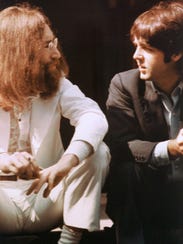
John Lennon, left, and Paul McCartney talk during the photo session for the cover of the "Abbey Road" album in 1969. (Photo: LINDA MCCARTNEY, AP)
McCartney, for his part, tried to defend himself from Lennon and other critics who saw him as soppy. "Some people want to fill the world with silly love songs, And what's wrong with that, I'd like to know," he sang with his post-Beatles band, Wings. But wouldn't you know it: "Silly Love Songs" spent five weeks as a Billboard No 1. The fact that McCartney could turn even a wry send-up of commercial songwriting into a commercial hit didn't make his critics like him any better.
"He wrote some ditties," Diken says. " But it takes a certain skill to craft songs of a Tin Pan Alley caliber."
When Lennon was assassinated on Dec. 8. 1980, the tragedy only served to burnish John's halo. Meanwhile, Paul spent the 1980s producing hits like "Ebony and Ivory" (1982, with Stevie Wonder) and "Say Say Say" (1983, with Michael Jackson) that seemed to confirm the critical notion that he was a lightweight, a skillful but shallow pop machine.
"Lennon became saintly, a martyr," Wills says. "Paul is still around, but he's doing duets with Michael Jackson."
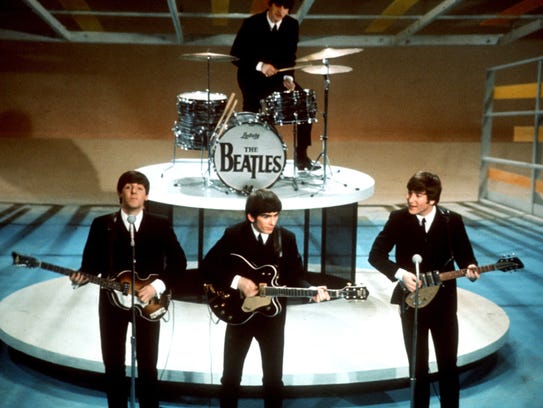
The Beatles perform on "The CBS Ed Sullivan Show" in New York on Feb. 9, 1964. (Photo: ASSOCIATED PRESS)
A reassessment in the 1990s
Things began to turn around in the 1990s — for several reasons.
The first was "The Beatles Anthology," a TV documentary series (and accompanying album set) that was first seen in November 1995. This up-close, meticulous look at the most famous collaboration in rock history revealed that Paul was much more key to many favorite Beatles tracks than had been previously assumed.
"People who had no idea who wrote what, who sang what, were seeing this," Wills says. "Oh, 'Fool in the Hill' is Paul? I didn't know that. Paul plays the Mellotron on 'Strawberry Fields'? I had no idea. It was a revelation, not for hardcore fans, but for the general public."
The second was an "authorized" biography, "Paul McCartney: Many Years From Now," by Barry Miles. Though transparently an exercise in reputation boosting, it also called attention to the many unsung ways that McCartney had enhanced the Beatles' sound. After Lennon, once described by a journalist as the "laziest person in England," went home to his family in Weybridge, southwest of London, Paul — then a bachelor — spent his nights mixing with cutting-edge artists and classical composers, and bringing what he learned to the table. Much that was groundbreaking about The Beatles' music, people now began to say, was Paul's doing.
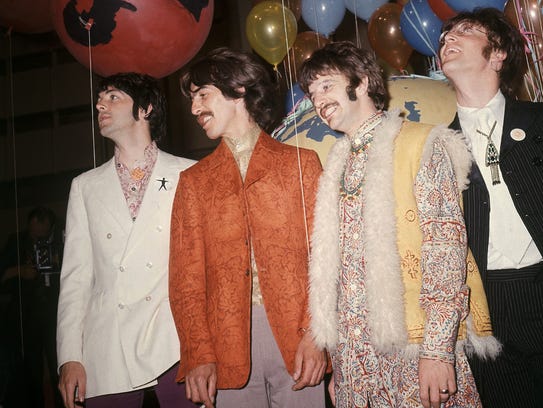
The Beatles — from left, Paul McCartney, George Harrison, Ringo Starr and John Lennon — at EMI studios in London during a break in rehearsals for the live broadcast of the "Our World" television program in June 1967. (Photo: Associated Press)
"He would go to these avant-garde places and meet all these artists, and expand his horizons," Lapidos says. "When he came back to record, he wanted to do things differently. He was more experimental. Not that the others weren't — not that John wasn't, for sure — but Paul had the on-the-ground experience."
It also became clear that the dichotomy critics had set up — John the edgy, "authentic" Beatle, versus Paul the sweet, squidgy Beatle — didn't hold up on examination. It was Paul, after all, who had written "Helter Skelter," "I'm Down," and "Oh! Darling." It was John who wrote "Good Night," "All You Need is Love" and (later) "Imagine."
"They could both write beautiful love songs, they could both write hard, edgy songs," Lapidos says.
In 1997, Paul McCartney was knighted — the only Beatle to be so honored — and thus became a British institution, like Westminster Abbey and clotted cream.
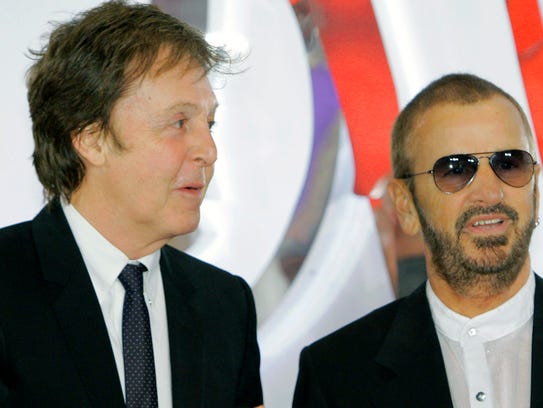
McCartney and Starr attend the first anniversary of Cirque du Soleil's Beatles show "Love" at the Mirage hotel and casino in Las Vegas in 2007. (Photo: Jae C. Hong, AP)
Finally, Paul is the beneficiary of the greatest gift of all. He's alive. John and George (who died Nov. 29, 2001) are gone. Ringo, busy with his audience-pleasing All-Starr Band, is in his own orbit. That leaves Paul as the beloved torch-bearer of the Beatles legacy — which just happens to be the greatest in the history of rock.
"What's happened is that the balance has been redressed," Wills says. "Now people go, 'John and Paul really needed each other.' They were great as solo artists, but they were phenomenal together."
WHAT: Paul McCartney, "One on One" tour
WHEN: 8 p.m. Sept. 11 and 12 (Prudential Center, Newark), 8 p.m. Sept. 15 and 17 (Madison Square Garden, New York), 8 p.m. Sept. 19 and 20 (Barclays Center, Brooklyn), 8 p.m. Sept. 26 and 27 (Nassau Coliseum, Uniondale N.Y.).
WHERE: Prudential Center, 25 Lafayette St., Newark; Madison Square Garden, 4 Pennsylvania Plaza, Manhattan; Barclays Center, 620 Atlantic Ave., Brooklyn; Nassau Veterans Memorial Coliseum, 1255 Hempstead Turnpike, Uniondale, N.Y.
HOW MUCH: $34 and up, depending on venue. 800-745-3000 or ticketmaster.com.


No hay comentarios:
Publicar un comentario